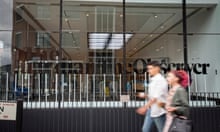The Guardian’s parent company has confirmed it hit its financial break-even target, as revenue rose to £224.5m in the last financial year, aided by growth in digital revenues and increased contributions from readers.
Guardian Media Group confirmed preliminary figures showing that its main Guardian News & Media subsidiary recorded an operational profit of £800,000 for the first time in many years.
The accounts also detail the success of the business’s overseas operations for the first time. Revenue from advertising and reader contributions at the online-only Guardian US and Guardian Australia operations grew to £30.8m in the last financial year, equivalent to 14% of Guardian Media Group’s global revenues.
This helped the company grow total revenues 3% to £224.5m in a tough market, with a record 163 million unique browsers and 1.35bn page views in March 2019. The Guardian now has 655,000 regular paying supporters with an additional 300,000 one-off contributors in the past 12 months.
Guardian Media Group is owned by the not-for-profit Scott Trust, which has an endowment of £1bn built up over many years through past investments in companies such as AutoTrader. The return on this investment allows Guardian Media Group to subsidise its news operations by up to £30m a year and remain sustainable while guaranteeing its independence.
Although income from the Guardian’s print operations remains a very significant part of the business, largely due to the cover price paid by readers, the majority of the company’s income now comes from its digital operations.
UK print advertising now accounts for just 8% of total income, in stark contrast to many rival British news organisations, which remain heavily wedded to revenue from newspaper advertising and as a result are being hit hard by the industry-wide decline in circulations.
Guardian Media Group’s chief executive, David Pemsel, said: “Achieving a third successive year of revenue growth and meeting our break-even target for GNM is a tribute to everyone within our organisation. GNM has been transformed in the last three years into a more reader-funded, more digital and more international business.”
In order to hit its financial targets and reduce costs, the accounts show Guardian Media Group paid out £4.3m in redundancy payments to staff in the last financial year. This was aided by a voluntary redundancy scheme under which the total headcount fell from 1,475 to 1,437 across editorial, sales, and support divisions.
Pemsel was the highest-paid director at Guardian Media Group, earning a total pay package of £706,000 a year. Directors did not receive bonuses for hitting the company’s break-even target although the three leading directors, whose income has remained largely static during the implementation of the turnaround plan, have now had their remuneration reviewed and will receive a 5% increase in their base salary for the next financial year. Other Guardian staff will receive the equivalent of a 5% increase over a period of 18 months.
Last year Guardian Media Group took a financial hit relating to the closure of its own printing sites as part of the decision to switch to a tabloid format and outsource production of the physical paper, enabling it to reduce costs in the long term.
This article was amended on 9 August 2019 to clarify the periods to which remuneration increases relate.










